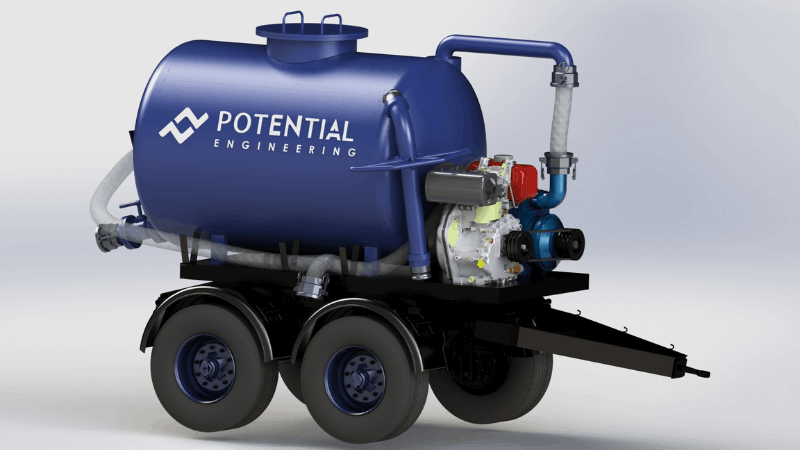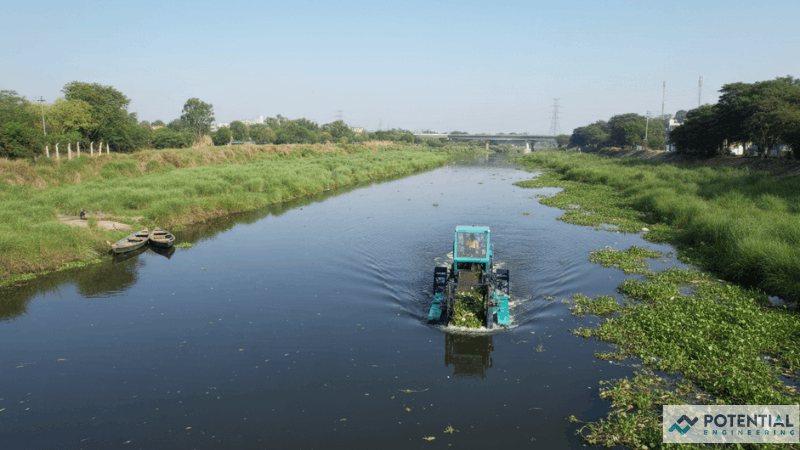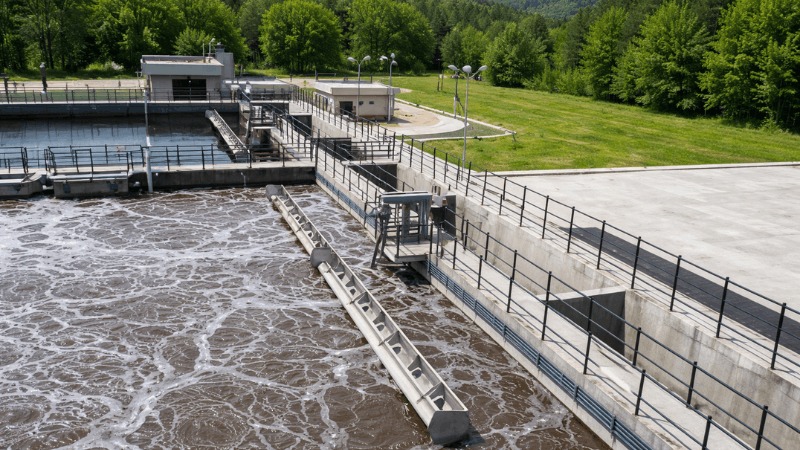Oil Skimmers for the Food Processing Industry

The Food Processing industry produces a wide range of foodstuffs, caters to a large audience and is growing significantly. The process of transforming agriculture, dairy, animal husbandry, meat, poultry, etc., into food products generates a large volume of waste. One of the many challenges of waste management is oil removal from wastewater.
The food industry, at all times, is expected to maintain the quality of products, processes, and safe disposal of wastewater. Oil is commonly used in the food processing industry either to make food products like dressings & sauces or in cooking and frying for manufacturing packaged foods. In both cases, the equipment and machinery get coated with oil. Regular cleaning results in a good mix of oil, water & detergent in the wastewater. Similarly, the waste oil used or produced during food production also ends up in the wastewater stream.
The Challenge:
Removal of oil from the wastewater should ensure:
1. Optimal process efficiency of wastewater treatment plant
2. Adhere to the permissible discharge norms
3. Adoption of an environment-friendly method
Oil Skimmers in the Food Processing Industry
The food processing industry generates waste oil from plant-based oils and animals in the form of fats. Both the oils are organic in nature. Organic oils are hydrophobic and have a lower specific gravity than water i.e., the oil does not dissolve in water but floats to the surface. However, organic oils form emulsions with water, which leads to an increase in the volume of the oil-water mix.
The physical properties of oils – specific gravity, surface tension, and affinity allow the separation of oil from water that floats to the surface unless agitated. Oil can be efficiently removed from wastewater using a suitable oil skimmer.
Types of Oil Skimmers for the Food Processing Industry
Traveling Bridge System
A traveling bridge system is ideal for removal of grease and grit from wastewater. The system is placed above a rectangular tank and consists of a moveable truck. During the upward run, the bridge collects and skims oil & floating debris with the help of a surface scraper. On the return run bottom scraper removes grit.
The key advantages of a travelling bridge system are:
1. Easy to install
2. High efficiency
3. Low operating costs
Chain Scraper System
The chain Scraper system is ideal for vegetable oil plants, oil extraction lines, and other oil pressing units. The system covers the length of the tank using multiple scrapers to remove floating debris and oils from the surface of wastewater.
The key advantages of a chain scraper system are:
1. Simple mechanism
2. High efficiency
3. Low power consumption
Slotted Pipe System
A slotted pipe system is a type of oil skimmer wherein a pipe with a half cut is used to catch floating oil. The slotted pipe is placed at the end of the separation bay. The pipe is rotated at an angle to ensure that the slotted section is just above the water and in the oil layer, collecting oil under weir flow conditions.
The key advantages of a slotted pipe system are:
1. Simple design
2. Covers the width of the tank
3. Most economical
Weir Skimmers
Weir skimmer works on gravitational force to drain oil from the water’s surface. Weir skimmers are floating units where the edge of the weir is positioned just below the upper slick surface or at the interface between the floating oil and water, allowing oil to flow over the weir edge into a collecting sump. From the collecting sump the oil is pumped to the storage tanks.
The key advantages of a weir skimmer are:
1. 360* skimming action
2. Removes floating contaminants
3. Easy to install and operate
To identify the most suitable oil skimmer for a particular food processing unit, a few key parameters must be considered, which are:
1. Volume of water
2. Amount of oil and grease in wastewater
3. Presence of floating contaminants
4. Temperature of water
5. Regulatory requirements
Oil skimmers have proved to be an effective solution in treating oily wastewater for the food processing industry. In certain cases, a combination of a skimmer with a decanter or coalescing unit may prove to be more efficient. Oil skimmers are not only mere equipment that removes oil from water, they also bring along added advantages that cannot be understated, which are:
1. Revenue generation:
Oil skimmers recover oil, which has value. The oil recovered from waste can be recycled. Often the recovered oil can be cleaned and brought back to its original specifications at a minimum cost. This oil can be used to manufacture other products, for example, the food industry often uses recovered waste oil for manufacturing soap, biodiesel, etc. In this case, recovered oil is a source of income.
2. Reduced operational cost: Oil skimmers remove oil from water resulting in ;
- a. Reduction in overall water consumption by extending the life of process water
- b. Reduced maintenance of water and filtration equipment
- c. Reduce the amount of chemicals required to treat process water/wastewater
- d. Reduce costs associated with wastewater disposal
- e. Recovered water can be reused, thereby saving on water expenses
3. Improves overall plant operations:
In conjunction with the above benefits, oil removal ensures that the wastewater treatment plant works at its optimum levels. The presence of oil in wastewater significantly affects the plant performance, which is taken care of by the use of an oil skimmer.
4. Environment-friendly:
An oil skimmer is an environment-friendly equipment as they do not require the use of chemicals. They remove oil and also address oil-related contamination concerns. Oil skimmers increase the potential to reuse/recycle oil, water, and other valuable products.
Oil skimmers are an essential part of wastewater treatment in the food processing industry as they offer a number of advantages. Most of the oil skimmers are highly efficient and easy to install, operate, and maintain. These oil skimmers prove to be effective for the food processing industry as they not only ensure oil removal but also address the issue of floating debris found in the food processing wastewater streams.
Frequently Asked Questions
Q.1 What are the benefits of using a floating oil skimmer?
A. Floating oil skimmers are highly effective tools for removing oil and contaminants from the surface of water. Their benefits include efficient oil removal, environmental protection, and cost savings. By floating on the water’s surface, they can rapidly and continuously remove oil, preventing environmental damage and minimizing cleanup costs.
Q.2 How does an industrial oil skimmer work?
A. An industrial oil skimmer works by using various methods to separate and remove oil or hydrocarbons from water or other liquids. Typically, it utilizes a floating collector, such as a belt, disk, or tube, to attract and gather the oil from the surface of the liquid. The collected oil is then separated from the skimmer and can be further processed or disposed of, leaving the liquid cleaner and free from hydrocarbon contamination.
Q.3 Why are sluice gates important in managing water levels?
A. Sluice gates are crucial in managing water levels because they allow for controlled water flow in rivers, canals, and reservoirs. By adjusting the gates’ position, authorities can regulate the water volume, preventing flooding during heavy rainfall and ensuring an adequate water supply during droughts. This controlled management helps safeguard communities, ecosystems, and agricultural areas from the adverse effects of fluctuating water levels.





